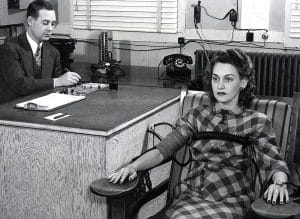I was chatting to an IELTS examiner about things that stop students doing well on their speaking and writing tests and one thing he said was really interesting- ‘The speaking and writing tests are not lie detector tests.’
What he means is that many students think that you have to tell the absolute truth. You don’t.
For example, a student in his class was asked to describe their favourite outfit during a practice exercise. The student said they couldn’t remember any details about their favourite outfit, so they stopped speaking after 10 seconds. When asked about this, the student explained that they really couldn’t remember anything, so there was nothing they could do. There was, lie!
You will never lose marks for being dishonest during the test, as long as your lies sound plausible and answer the question.
For example, the student above could have simply invented their favourite outfit and then added imaginary details. In this way they would have been telling a story that is false, but they would get a much higher score for their answer because it was fully developed.
Below are some other ways you can use lies to help you:
Part 1 Speaking
Most of these questions will be about you, so you shouldn’t really have to lie. However, there might be some things that you can’t remember. When this happens you can simply elaborate with a few things that might not be true.
For example, you might be asked to tell the examiner about your house. If you can’t remember the names of the rooms or the different furniture, simply tell them about rooms/furniture that you can remember, even if they are not actually in your home.
Part 2 Speaking
People often run out of things to say in this part and it is much easier if you can make things up.
You might have to describe your favourite book or the last movie you watched. If you can’t remember some of the details, don’t panic, simply add in false details. Don’t worry, the examiner is never going to stop you and tell you that it is untrue. It is much better to lie and keep talking, than hesitate or pause because you have nothing to talk about.
For example, I asked a student to talk about the last movie they saw. I don’t know why, but they said they couldn’t remember the last movie. I told them to just tell me about any movie they could remember. ‘Isn’t that telling lies?’ said the student. It doesn’t matter, it is a speaking test, not an honesty test.
Part 3 Speaking
This is probably the part that will help you the most because you will be asked questions that you might not know much about and the examiner also wants you to give fully developed, extended answers.
If you know nothing about what the examiner is asking because you have no experience dealing with that topic, pretend you do. I was doing a speaking test today and I asked a student two questions:
- Are police respected in your country?
- Who is respected more, police or lawyers?
She had no idea how to answer these because she said she had never met a police officer or a lawyer in her entire life. Her answers were not so good because of this and her fluency really suffered. Instead she could have simply made up some stories or facts and told me what she thought. It would have been much better for her to speculate what people think of police and lawyers, than to stumble through her answers with mostly ‘ummms’ and ‘ahhhhs’.
Remember there is no right or wrong answer to these questions. The examiner is not testing your ability to give a ‘correct’ answer, they are testing your ability to communicate in English.
Writing Task 2
Each of your main ideas in your essay should be supported by an example. This helps to fully develop your ideas and boosts your score. One of the complaints I hear from students is that they cannot think of examples. Again, make them up.
You have to be more careful with these because they really must sound plausible. I was teaching a student this technique and in their next essay about banning smoking in public places they said ‘92% of British people died from passive smoking last year.’ This is a made up example, but it is totally unbelievable. You should only use made up examples that make sense and actually help support your main idea.
Won’t the examiner check?
No. The examiners won’t be taking out their phones and checking all of your facts. They are testing your ability to communicate in English, not how truthful you sound.
Should I lie as much as possible?
No. This is not what this guide is about. Telling the truth should always be your first option because it is much easier to talk about something that is real. However, if you are struggling to find an answer, don’t be afraid to make some details up.
I hope you found the above useful. For more information about IELTS, please feel free to have a look around the site.




